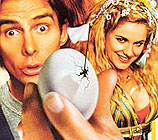|
|
|
|
Mr
Accident
|
 |
|
Lest I be suspected of irony or perversity in what follows, I hereby declare that every opinion in this review is sincerely and strongly held. Director-writer-star Yahoo Serious' Mr Accident, is by far the best, most admirable and enjoyable Australian film I saw in the year 2000. No one could be more surprised by this reaction than me: Serious' earlier efforts, Young Einstein (1988) and Reckless Kelly (1993), left me bemused rather than amused. Mr Accident, however, is a tremendous breakthrough. One would not glean this from most of the published commentaries on it. All I heard about this movie prior to seeing it was that it wallows in slapstick, peddles some simplistic message about national identity (as did Reckless Kelly), and confusingly alternates childlike humour with mildly risqué bits. Detractors portrayed it as an ersatz, superficial and opportunistic confection – unreal and (what's worse) unfunny. Some of these remarks are partly true – but every one of them is, ultimately, beside the point. What kind of strange and wondrous film is Mr Accident? A synopsis is not the best way into a proper appreciation of its unique qualities. Roger Crumpton (Serious) is an accident-prone guy who, despite this seeming curse, is endlessly fascinated with the world of objects. His love interest, Sunday Valentine (Helen Dallimore), wishes to make contact, one day, with aliens. Meanwhile, the beastly Duxton Chevalier (David Field) takes over an egg company and reorients its manufacturing processes in mysterious, suspicious directions. So much for plot. It is more the sensibility or style of the piece that has really rankled some people. Serious has been taken to task for making a film in which every detail (from props to facial expressions) is exaggerated for effect: the ultimate in Australian quirkiness. The best screen comedies (so this argument goes) depend on situating their gags within a realistic, plausible, coherent world. This is a spurious and reductive way of approaching Mr Accident – and, indeed, many great screen comedies. Serious clearly has a better understanding of the context in which he works than his critics do. This is a cartoonish movie in the tradition of last year's overlooked Inspector Gadget (1999), or the more extreme exercises by the Coen brothers (such as The Hudsucker Proxy, 1994). In its conception and execution, Mr Accident is superbly accomplished. It took him three films to figure it out – a decent learning curve – but Serious has at last realised that all the elements of a movie must be stylised in concert. At every point of Mr Accident, the broad, physical gags are matched by a similar intensity of design, colour, camera angle and a particularly delightful and intricate soundtrack. Few Australian movies orchestrate this many aspects of cinematic language into such a pleasing whole. More plainly, where many local films are literally depressing to look at – shot with ugly filter-washes or dull, television-style, naturalistic lighting – Mr Accident is a gorgeous feast for the eye. And the actors, well cast in every case, respond with ingenuity to the special demands of this bracing stylisation. Serious has boldly adopted a disarmingly novel approach to narrative structure – with results that are more innovative than anything in Time Code (2000). The plot switches off its motor and delays, for a long time, even the central conflict between Crumpton and Chevalier. Instead, the film is like a level playing field on which diverse running gags constantly collide and then separate. Mr Accident is woven from a repertoire of obsessive motifs – some whose narrative function becomes clear only in the final minutes, and even then in a shaggy dog fashion. Fridges, pets, plunging stairs, the possibility of life on other planets, an imperishable hubcap, food, clothes, cigarettes: the film is a merry, surrealistic list of attractions great and small, suggesting some hitherto unimagined genre, like a sci-fi musical. The closest comparison in world cinema would be the wonderfully off-centre films of another do-everything maestro, Maurizio Nichetti (The Icicle Thief, 1989). Further heartening comparisons suggest themselves. The comic art of Jerry Lewis (far more than Jim Carrey) hovers over the elaborate gag sequences, particularly those involving an escalating destruction of interiors. Serious' set-pieces never quite reach the catastrophic heights of Jerry's singing lesson in The Patsy (1964), but they come close. Most central to Mr Accident, however, is the spirit of Lewis' mentor, the writer-director Frank Tashlin. As in Tashlin's Artists and Models (1955), two sets of same-sex friends inhabit the same building. Dallimore plays Sunday as an ultra-feminine stereotype (squeaky voice, fairy gear) with the same vigour and panache that Shirley MacLaine brought to her role in that film. Serious borrows Tashlin's love of magically animated objects, such as the garbage bags that build into a mass as they tumble down stairs. Most fundamentally – and poetically – Serious invents a quintessentially modern and supremely Tashlinesque mode of life for his hero. Although Crumpton has a nostalgic, fetishistic fixation on the consumer goods of the '50s, he has been drilled, since childhood, to take every man-made object apart. It is his genius but also his pathos, since he neglects to put anything back together again. Like Tony Randall in Will Success Spoil Rock Hunter? (1957), who dreamed of making a new species of rose, Crumpton must learn to combine his technophilia with good, old-fashioned imagination. And Serious' own film is an invention of the same order: craftily assembled with loving know-how, but alchemically transformed by inspired touches of whimsy and delirium. This is why it pitches itself, so unselfconsciously, to child and adult viewers alike – it is a proudly mutant object for the polymorphous alien in us all. © Adrian Martin September 2000 |
![]()